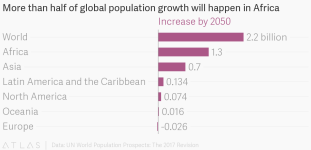Sorry to warm up an old post, but...
From Psychology Today:
Can evolutionary psychology provide insights to aid in our survival?
''Can humans be "smarter than yeast?" Can we be the only species that can successfully anticipate and avoid ecological overshoot and collapse? Issues of sustainability are psychological problems. Are we sufficiently psychologically sophisticated to manage our own collective behavior to achieve sustainability on a finite planet?
One sobering answer provided by evolutionary psychology is that we, like all other species, have no evolved psychological adaptations designed specifically to perceive, anticipate and avoid ecological overshoot. In fact, we have just the opposite.
One problem is that inclusive fitness, the "designer" of psychological adaptations, is always relative to others; it is not absolute. That is, nature doesn't "say," "Have two kids (or help 4 full sibs), and then you can stop. Good job! You did your genetic duty, you avoided contributing to ecological overshoot, and you may pass along now..." Instead, nature "says" (relative inclusive fitness): "Out-reproduce your competitors. Your competitors are all of the genes in your species' gene pool that you do not share. If the average inclusive fitness score is four, then you go for five... "In other words, our psychological adaptations are designed to not just "keep up with the Joneses" but to "do better than the Joneses." This is in whatever means that may have generally helped to increase inclusive fitness, such as status, conspicuous consumption, and resource acquisition and control.''
Thanks for this excellent reminder that most of what flies under the banner of "evolutionary psychology" is pseudo-science with very little regard for either evolution, or psychology.
Evolution doesn't care about about what you
want. It only "cares"* about outcomes, and that is speaking very loosely. It doesn't care* whether you're happy spreading your genes, it only cares* that you do. In an environment that doesn't include reliable contraceptives, that is in the environment in which all of our ancestors grew up (up to and including our grandparents), a healthy sex drive combined with a disinclination to kill or neglect your offspring once born, was perfectly sufficient to ensure that you'd end up with a bunch of kids. A
desire to have many kids was thus an unnecessary luxury and as such not subject to selection. That's the "no regard for evolution" part.
As for the "no regard for psychology" part: People tend to find normal what they see around them, and they tend to find the normal desirable. So people expressing a desire for large families is no evidence at all for an evolutionarily instilled instinct to want large families.
But what does more to make your article pseudo-science than both of those shortcomings combined is its disregard for empirical evidence. Human populations do not, in fact, grow exponentially. If your theory predicts that they do, that human nature is such as to make this inevitable, you can throw it out the window right away (even if we didn't know where it went wrong, which we do, see my second paragraph above). The empirical evidence is clear and unambiguous: the psychological makeup of extant humans, the way we've evolved over the last 199,950 years, is such that, in an environment were reliable contraceptives
are available, the average number of children per woman will be something between 1.5 and 1.8.
--
Now of course, evolution is still ongoing, and given our new environment, an instinct to want many kids, absent as it obviously is in today's population, may well emerge in a matter of millennia. In an environment where liking a good fuck and being disinclined to commit infanticide are no longer good enough, there now is a selection pressure towards it. Then, and only then, overpopulation might become a problem reasonable people should worry about - until then, if anything,
underpopulation is a valid concern: At 1.5 children per woman, assuming a sex ration close to 1:1, every generation is 75% of the last - in a mere 10 generations, this represents a 95% drop. Even if fertility stabilises at 1.8, the same effect will only be delayed by a few short centuries - at a reproduction factor of 0.9, the same 95% reduction will take a mere 28 generations. It is doubtful that this is enough time for an adaptation to this new environment of ours to kick in before society as we know it collapses from a shortage of people.
* Only figuratively of course. It doesn't "care" at all, it only produces some outcomes more often than others. A desire for large families, though isn't an outcome that it can be predicted to produce (though it
is a possible outcome of cultural evolution, if only because people tend to idealise what they have to live with anyway).



